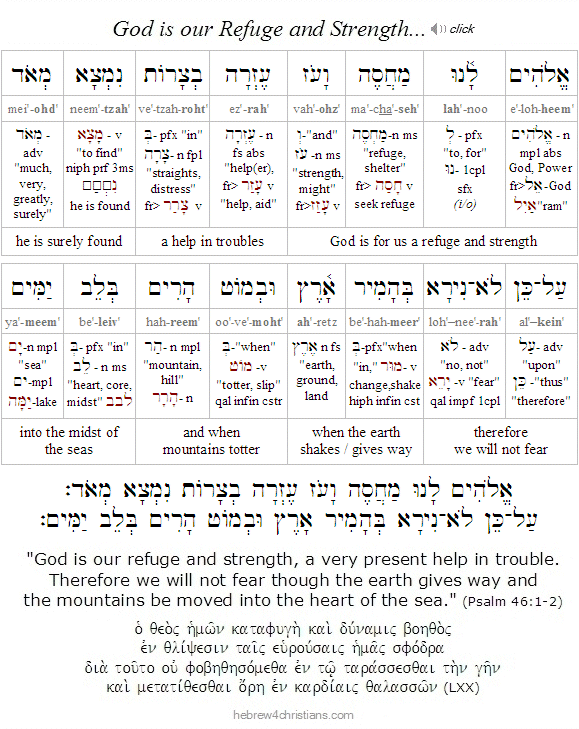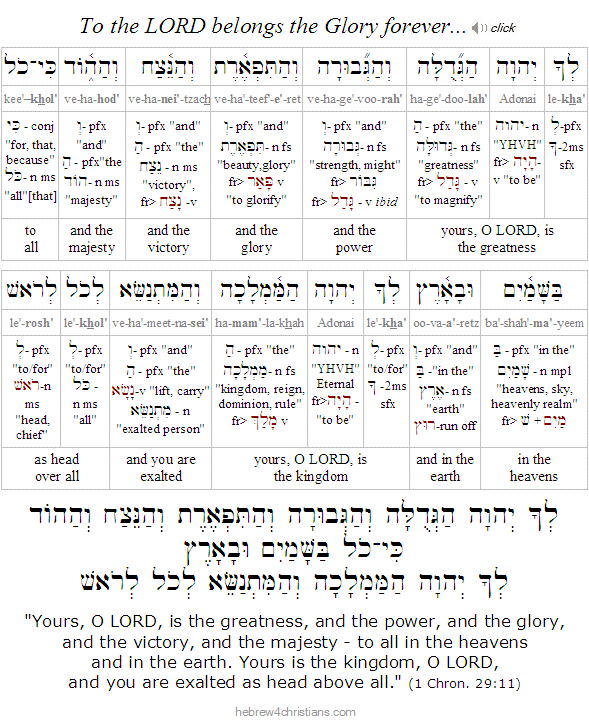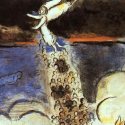|
Are you discouraged by this evil world, chaverim? Do you sometimes utter the plaintive prayer: "O Lord, I know that you will help us; but will you help us before you will help us?" When things are dark and seemingly hopeless, it is tempting to yield to passivity and even to despair, but it is precisely then that our faith must rise up and become all the more emboldened. Faith in God's love is the victory (i.e., netzach: „†÷ґ„¶÷Ј„Ч) that overcomes the world and its illusions (1 John 5:4). We must remember that the LORD is our Deliverer and Kinsman Redeemer („Ф÷Ј„Т÷Љ„Х÷є„Р÷µ„Ь), a "very present help" in our troubles:
„Р„Ь÷є„Ф÷і„Щ„Э „Ь÷Є„†„Х÷Љ „Ю÷Ј„Ч÷∞„°÷ґ„Ф „Х÷Є„Ґ÷є„Ц
„Ґ÷ґ„Ц÷∞„®÷Є„Ф „С÷∞„¶÷Є„®„Х÷є„™ „†÷і„Ю÷∞„¶÷Є„Р „Ю÷∞„Р„У
„Ґ÷Ј„Ь÷Њ„Ы÷Љ÷µ„Я „Ь„Р÷Њ„†÷і„Щ„®÷Є„Р „С÷Љ÷∞„Ф÷Є„Ю÷і„Щ„® „Р÷Є„®÷ґ„•
„Х÷Љ„С÷∞„Ю„Х÷є„Ш „Ф÷Є„®÷і„Щ„Э „С÷Љ÷∞„Ь÷µ„С „Щ÷Ј„Ю÷Љ÷і„Щ„Э
e¬Јloh¬Јheem ¬Ј lah'¬Јnoo ¬Ј ma¬Јcha¬Јseh ¬Ј vah¬Јohz
ez¬Јrah ¬Ј ve¬Јtzah¬Јroht ¬Ј neem¬Јtzah ¬Ј me¬Јohd
al-kein ¬Ј loh-nee¬Јrah ¬Ј be¬Јha¬Јmeer ¬Ј ah'¬Јretz
oo¬Јve¬Јmoht ¬Ј ha¬Јreem ¬Ј be¬Јleiv ¬Ј ya¬Јmeem

"God is our refuge and strength,
a very present help in trouble.
Therefore we will not fear though the earth gives way
and the mountains be moved into the heart of the sea."

 |
The great Passover („Ч„Т „Ф„§„°„Ч „Ф„Т„У„Х„Ь „С„Ю„¶„®„Щ„Э) is all about the victory of God over the powers of darkness for the sake of our deliverance („Щ÷∞„©„Б„Х÷Љ„Ґ÷Є„Ф). "Let my people go!" Indeed, the month of Nisan is called Chodesh ha-yeshuah („Ч„У÷ґ„©„Б „Ф÷Ј„Щ÷∞„©„Б„Х÷Љ„Ґ÷Є„Ф), the "month of the salvation," both in terms of remembering the physical deliverance from the political powers of Egypt, but more profoundly in terms of our spiritual deliverance given at Zion/Moriah through the Messiah. Chodesh ha-yeshuah can also be read as chadash ha-yeshuah, "the new („Ч÷Є„У÷Є„©„Б) salvation," suggesting the new covenant power we are given in the Messiah. We wrestle not against flesh and blood, chaverim, but against hidden powers of darkness that seek to enslave us as Pharaoh did of old (Eph. 6:12). But thanks be to God who gives us the victory (netzach, salvation) through our Lord Yeshua the Messiah (1 Cor. 15:57).
„Ь÷∞„Ъ÷Є „Щ÷∞„Ф„Х÷Є„Ф „Ф÷Ј„Т÷Љ÷∞„У÷ї„Ь÷Љ÷Є„Ф „Х÷∞„Ф÷Ј„Т÷Љ÷∞„С„Х÷Љ„®÷Є„Ф „Х÷∞„Ф÷Ј„™÷Љ÷і„§÷∞„Р÷ґ„®÷ґ„™
„Х÷∞„Ф÷Ј„†÷Љ÷µ„¶÷Ј„Ч „Х÷∞„Ф÷Ј„Ф„Х÷є„У „Ы÷Љ÷і„Щ÷Њ„Ы„Ь „С÷Љ÷Ј„©÷Љ„Б÷Є„Ю÷Ј„Щ÷і„Э „Х÷Љ„С÷Є„Р÷Є„®÷ґ„•
„Ь÷∞„Ъ÷Є „Щ÷∞„Ф„Х÷Є„Ф „Ф÷Ј„Ю÷Љ÷Ј„Ю÷∞„Ь÷Є„Ы÷Є„Ф „Х÷∞„Ф÷Ј„Ю÷Љ÷і„™÷∞„†÷Ј„©÷Љ„В÷µ„Р „Ь÷∞„Ы„Ь „Ь÷∞„®„Р„©„Б
le¬Јkha ¬Ј Adonai ¬Ј ha¬Јge¬Јdoo¬Јlah ¬Ј ve¬Јha¬Јge¬Јvoo¬Јrah ¬Ј ve¬Јha¬Јteef¬Јe'¬Јret
ve¬Јha¬Јnei'¬Јtzach ¬Ј ve¬Јha¬Јhohd ¬Ј kee¬Јkhol ¬Ј ba¬Јshah¬Јma'¬Јyeem ¬Ј oo¬Јva¬Јah'¬Јretz
le¬Јkha ¬Ј Adonai ¬Ј ha¬Јmam'¬Јla¬Јkhah ¬Ј ve¬Јha¬Јmeet¬Јna¬Јsei ¬Ј le¬Јkhol ¬Ј le¬Јrosh

"Yours, O LORD, is the greatness and the power and the beauty
and the victory and the majesty, for all that is in the heaven and in the earth is yours.
Yours is the kingdom, O LORD, and you are exalted as head above all."
(1 Chron. 29:11)


Passover is really a month-long celebration. Over and over it is referred to as the "month of spring" („Ч„У÷ґ„©„Б „Ф÷Є„Р÷Є„С÷і„Щ„С), the "month of redemption," the month of Nisan, and so on. The word Nisan („†÷і„Щ„°÷Є„Я) itself might come from either the word nitzan („†÷і„¶÷Љ÷Є„Я), meaning "bud" (Song 2:12), or the word nissim („†÷і„°÷Љ÷і„Щ„Э) meaning "miracles," both of which suggest physical and spiritual resurrection in our lives. Others think the word comes from the verb nus („†„Х÷Љ„°), meaning "to flee," both in relation to Israel's flight from Egypt and Egypt's flight from Israel (i.e., when the pursuing Egyptian cavalry fled („†÷Є„°÷і„Щ„Э) before the sea closed upon them (Exod. 14:25, 27). We also see this usage in the verse: "The wicked flee („†÷Є„°„Х÷Љ) when no one pursues, but the righteous are bold as a lion" (Prov. 28:1). The devil's power is found in the lie. If he can make you afraid, you will not think clearly. Establishing your faith in the truth will embolden you to deal with the lies and distortions that are intended to enslave you in fear. As Yeshua said, the truth will set you free (John 8:32).
Yeshua is called the "Lion of the tribe of Judah" („Ф÷Є„Р÷Ј„®÷∞„Щ÷µ„Ф „Ю÷і„©÷Љ„Б÷µ„С÷ґ„Ш „Щ÷∞„Ф„Х÷Љ„У÷Є„Ф) and the "Root of David" („©„Б„®÷ґ„©„Б „У÷Љ÷Є„Х÷і„У). Notice that the name Judah („Щ÷∞„Ф„Х÷Љ„У÷Є„Ф) includes the Name YHVH („Щ„Ф„Х„Ф) with the insertion of the letter Dalet („У), suggesting that this shevet (tribe) would be the "door" or "gate" into the presence of God. Yeshua the Messiah was from the tribe of Judah who described Himself as ha-sha'ar („Ф÷Ј„©÷Љ„Б÷Ј„Ґ÷Ј„®) "the gate" (John 10:9). Putting our faith in Yeshua gives us bold access to the throne of God's grace so that we can find help (deliverance) in time of our need (Heb. 4:16).
In light of the conditions of this present evil world, we cry out for the Messiah to return now! We want His deliverance, just as He delivered the Jews from ancient Egypt with great signs and wonders. Most politicians, by definition, exhibit the Pharaoh-like lust to control and exploit people. They are called "the lords of the darkness of this world" / ѕДќњбљЇѕВ ќЇќњѕГќЉќњќЇѕБбљ±ѕДќњѕБќ±ѕВ ѕДќњбњ¶ ѕГќЇбљєѕДќњѕЕѕВ ѕДќњбљїѕДќњѕЕ (Eph. 6:12). This is the nature of the corruption of those who crave power over others... Today, so many people live in fear because they believe the propaganda of the "princes of this age." We must always keep in mind that reality centers on the LORD God of Israel, not in appearances and the rhetoric of political or media figures. Melo khol ha'aretz kevodo: „Ю÷∞„Ь„Р „Ы÷Є„Ь÷Њ„Ф÷Є„Р÷Є„®÷ґ„• „Ы÷Љ÷∞„С„Х÷є„У„Х, "the whole earth is filled with His glory (Isa. 6:3). And the LORD God of Israel cares about people's liberation from deception and tyranny. The story of the Exodus is His everlasting rebuke to all the world's dictators and should cause every politician to soberly assess their fate... The time is coming when His judgment will fall upon all the "kings of the earth who take counsel against the LORD and against His Mashiach" (Psalm 2:2).
The world runs on a different "clock" and operates under its own set of philosophical assumptions. The "wisdom of this world" (ѕГќњѕЖбљЈќ± ѕДќњбњ¶ ќЇбљєѕГќЉќњѕЕ ѕДќњбљїѕДќњѕЕ) is the prevailing cultural spirit that suppresses the reality of God's Presence and truth. Such "wisdom" is regarded as foolishness before God, and God has promised to "seize the so-called wise in their own craftiness" (1 Cor. 3:19). The life of faith, on the other hand, sees what is invisible. Faith (emunah) apprehends "the substance (бљСѕАбљєѕГѕДќ±ѕГќєѕВ) of things hoped for, the assurance (бЉФќїќµќ≥ѕЗќњѕВ, conviction, "correction," "argument," i.e., tokhachat: „™„Х÷є„Ы÷Ј„Ч÷Ј„™) of things not seen" (Heb 11:1). Faith "looks not to the things that are seen but to the things that are unseen. For the things that are seen are transient, but the things that are unseen are eternal" (2 Cor. 4:18).
Ultimately Passover is about experiencing the deliverance of God from our fears, despite the appearance of rampant wickedness in this world. During this season - and always - may He help us walk by faith („С÷Љ÷Є„Р÷±„Ю„Х÷Љ„†÷Є„Ф), not by sight (2 Cor. 5:7). May He give you comfort and reassure you of His strong arm of deliverance at this time...
 |
|






